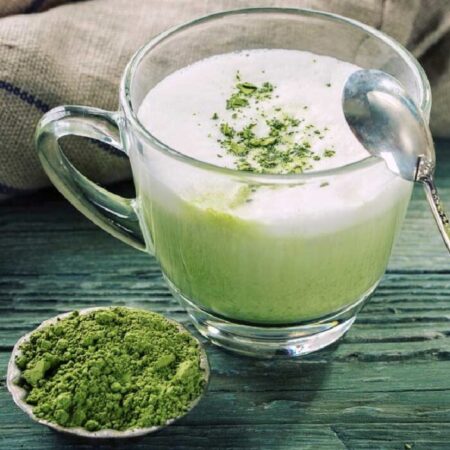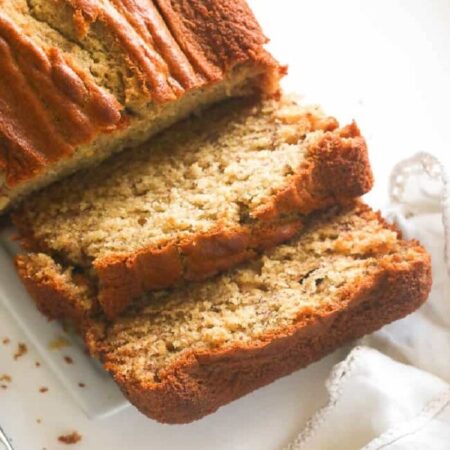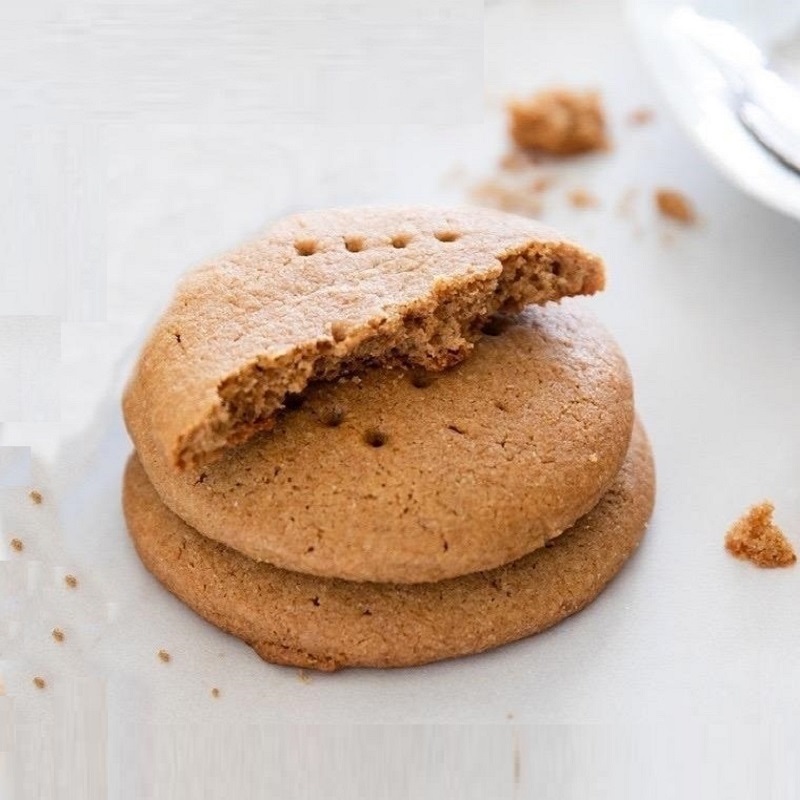
Digestive biscuits are a popular type of baked snack that has gained popularity worldwide. Known for their distinctive flavor and crumbly texture, digestive biscuits have become a staple in many households. However, when it comes to their health benefits and nutritional value, there is often a debate. In this article, we will explore what digestive biscuits are, delve into their ingredients, examine their nutritional values, discuss the benefits and risks associated with consuming them, and provide key takeaways to help you make informed choices about including digestive biscuits in your diet.
- What Are Digestive Biscuits?
- Ingredients In Digestive Biscuits
- Nutritional Values Of Digestive Biscuits (Per 100 Grams)
- Benefits Of Digestive Biscuits
- Are Digestive Biscuits Healthy?
- Risks Of Digestive Biscuits
- Recipe Of Healthier Version Of Digestive Biscuit
- Frequently Asked Questions
- Key Takeaways
Trivia
The term “digestive” in digestive biscuits was coined by Scottish doctors who believed the high baking soda content would aid digestion, although modern digestive biscuits may not have specific digestive properties.
What Are Digestive Biscuits?
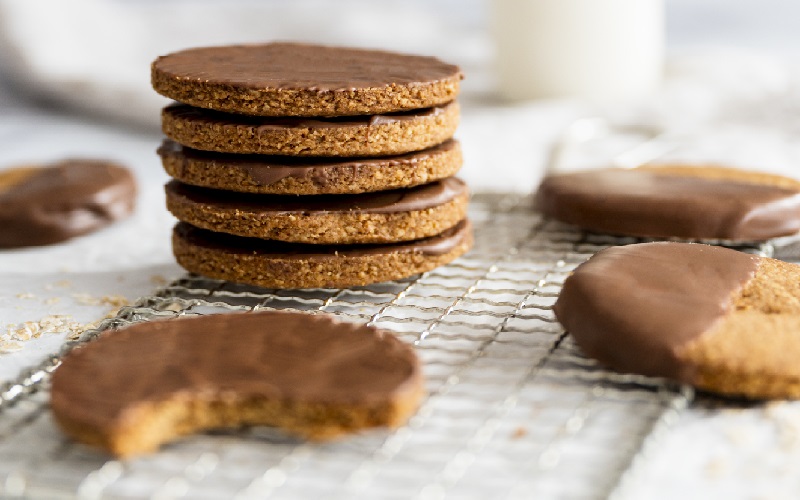
Digestive biscuits are a type of semi-sweet biscuit that originated in the United Kingdom in the 19th century. They were originally created by two Scottish doctors who aimed to develop a biscuit that aids in digestion. Digestive biscuits are made from a combination of whole wheat flour, sugar, vegetable oil, and a raising agent. The biscuits are baked until they acquire a golden brown color and a crisp texture. Over time, digestive biscuits have gained popularity worldwide and are now enjoyed as a snack on their own or used as a base for various desserts.
To understand better, let us first explore the ingredients in digestive biscuits.
Ingredients In Digestive Biscuits
The ingredients in digestive biscuits can vary slightly depending on the brand and recipe used. However, the basic ingredients commonly found in most digestive biscuits include:

- Whole Wheat Flour: The primary ingredient in digestive biscuits is whole wheat flour. It provides a good amount of dietary fiber, vitamins, and minerals.
- Sugar: Digestive biscuits typically contain a small amount of sugar, which contributes to their mildly sweet taste. Some variations may use alternatives like honey or syrup for sweetness.
- Vegetable Oil: Digestive biscuits are made with vegetable oil, such as palm oil or rapeseed oil, which adds moisture and helps bind the ingredients together.
- Baking Soda: Baking soda is used as a raising agent in digestive biscuits. It helps the biscuits rise and gives them a slightly airy texture.
- Salt: A small amount of salt is added to enhance the flavor of digestive biscuits.
- Additional Flavors: Some digestive biscuits may include additional ingredients such as oats, bran, or spices like cinnamon for added taste and texture.
Following is the nutritional composition of digestive biscuits in general:
Pro Tip
When choosing digestive biscuits, opt for those with lower sugar content and whole wheat flour for a healthier option. Remember to enjoy them in moderation as part of a balanced diet
Nutritional Values Of Digestive Biscuits (Per 100 Grams)
The nutritional composition of digestive biscuits can vary depending on the brand and specific recipe. However, here is a general overview of the approximate nutritional values per 100 grams of digestive biscuits:
| Nutritional Values (Per 100 Grams) | Amount |
|---|---|
| Calories | Around 460-500 kcal |
| Carbohydrates | 65-70 grams |
| Protein | 6-7 grams |
| Fat | 17-20 grams |
| Fiber | 5-8 grams |
| Sugar | 20-25 grams |
| Sodium | 0.3-0.5 grams |
Do these nutrients offer any health benefits? Keep reading to know more.
Benefits Of Digestive Biscuits

When consumed in moderation, a digestive biscuit may be a better alternative to regular biscuits or cookies. Here are its benefits:
- Fiber Content: Digestive biscuits are a source of dietary fiber, which is essential for a healthy digestive system. Fiber aids in regulating bowel movements, preventing constipation, and maintaining overall gut health.
- Sustained Energy: The combination of carbohydrates and fats in digestive biscuits provides a slow release of energy, making them a suitable snack for a quick energy boost.
- Micronutrients: Digestive biscuits made from whole wheat flour contain essential micronutrients like iron, magnesium, and B-vitamins. These nutrients are important for maintaining various bodily functions and promoting overall well-being.
These benefits may make you feel that digestive biscuits can be consumed guilt-free. But are they healthy if consumed regularly?
Are Digestive Biscuits Healthy?

While digestive biscuits have some nutritional benefits, it’s important to consume them in moderation. Here are a few considerations:
- Added Sugar: Digestive biscuits often contain added sugar, which can contribute to an excessive intake of empty calories and negatively impact overall health. Opting for biscuits with lower sugar content or choosing homemade versions with natural sweeteners can be a healthier choice.
- Fat Content: Digestive biscuits contain fats, including saturated fats, which should be consumed in moderation as excessive intake can lead to weight gain and increased risk of cardiovascular diseases.
- Portion Control: It’s crucial to be mindful of portion sizes when consuming digestive biscuits. Eating them in moderation as part of a balanced diet is key to enjoying their benefits without excessive calorie intake.
Risks Of Digestive Biscuits

Some of the risks related to regular consumption of digestive biscuits are:
- Processed Ingredients: Some commercial digestive biscuits may contain processed ingredients, additives, and preservatives. Regularly consuming such biscuits may lead to an increased intake of artificial substances, which can have long-term health implications.
- Allergens: Digestive biscuits may contain allergens like wheat, gluten, or dairy. Individuals with specific allergies or intolerances should check the product labels and opt for alternatives suitable for their dietary needs.
Quick Tip
To make your own healthier version of digestive biscuits, try using whole wheat flour, natural sweeteners like honey or maple syrup, and adding in nutritious ingredients like oats or flaxseeds for an extra boost of fiber.
Here is how you can make healthier version of digestive biscuits at home.
Recipe Of Healthier Version Of Digestive Biscuits
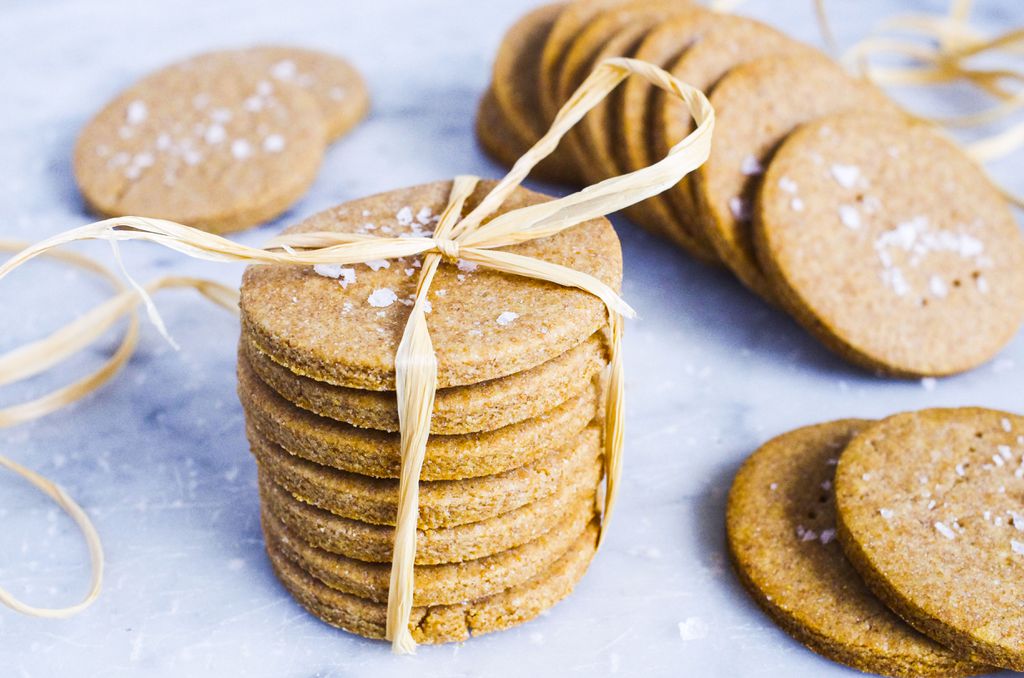
Ingredients:
- 1 cup whole wheat flour
- 1/4 cup coconut oil (or any other healthy oil of your choice)
- 2 tablespoons honey or maple syrup
- 1/2 teaspoon baking powder
- 1/4 teaspoon salt
- 2-3 tablespoons cold water
Steps To Prepare:
- Preheat your oven to 350°F (180°C) and line a baking sheet with parchment paper.
- In a mixing bowl, combine the whole wheat flour, baking powder, and salt.
- Add the coconut oil to the dry ingredients and use your fingertips or a fork to mix until the mixture resembles coarse crumbs.
- Add the honey or maple syrup to the mixture and mix well.
- Gradually add the cold water, one tablespoon at a time, while stirring the mixture until it forms a firm dough. Be careful not to add too much water.
- Dust your working surface with some flour and roll out the dough to about 1/4 inch thickness.
- Use a cookie cutter or a glass to cut out biscuit shapes from the dough. Place the biscuits onto the prepared baking sheet.
- Gather any leftover dough, reroll, and continue cutting out biscuits until all the dough is used.
- Bake the biscuits in the preheated oven for about 12-15 minutes or until they turn golden brown.
- Remove from the oven and let the biscuits cool on a wire rack before enjoying.
These homemade healthier digestive biscuits are a great alternative to store-bought ones as they contain whole wheat flour and natural sweeteners. They make for a delicious and guilt-free treat to enjoy with a cup of tea or as a snack on the go.
In conclusion, digestive biscuits offer a tasty and convenient snack option with some potential health benefits. Their fiber content, sustained energy release, and micronutrient profile make them a favorable choice for those seeking a light treat. However, it’s crucial to consider factors such as added sugar, fat content, processed ingredients, and portion control. By making mindful choices and consuming digestive biscuits in moderation as part of a well-balanced diet, you can enjoy their flavors while maintaining a healthy lifestyle. Remember, it’s always best to prioritize whole, unprocessed foods for optimal nutrition.
Frequently Asked Questions
Are digestive biscuits suitable for people with dietary restrictions?
Digestive biscuits may contain wheat, gluten, or dairy, making them unsuitable for individuals with certain dietary restrictions. It’s essential to read the product labels and choose alternatives that meet your dietary needs.Can digestive biscuits help with weight loss?
While digestive biscuits can provide a source of dietary fiber and sustained energy, they should be consumed in moderation as part of a balanced diet. Relying solely on digestive biscuits for weight loss is not recommended.Why are digestive biscuits so expensive?
Digestive biscuits can be more expensive due to factors such as the quality of ingredients used, production methods, and brand reputation. Additionally, certain brands may position themselves as premium or offer specialized variations, which can contribute to the higher price point.Do digestive biscuits have maida?
Yes, traditional digestive biscuits typically contain maida, which is refined wheat flour. However, healthier versions of digestive biscuits can be made using whole wheat flour as a substitute for maida.Can I eat digestive biscuits at night?
Yes, you can eat digestive biscuits at night, but it’s best to consume them in moderation due to their sugar and calorie content. Opt for healthier homemade versions or those with lower sugar content to make a lighter choice for a nighttime snack.Can I eat digestive biscuits daily?
While digestive biscuits can be enjoyed as a part of a balanced diet, it is not advisable to eat them daily due to their sugar and fat content. Moderation is key to maintain a healthy diet and lifestyle.
Key Takeaways
- Digestive biscuits can be a tasty and convenient snack, but should be consumed in moderation as part of a balanced diet.
- Pay attention to the added sugar and fat content in digestive biscuits and opt for healthier versions with lower sugar and whole wheat flour.
- Homemade digestive biscuits using natural sweeteners and nutritious ingredients can be a healthier alternative.
- Consider portion sizes and be mindful of processed ingredients and potential allergens.
- Prioritize whole, unprocessed foods for optimal nutrition and overall well-being.























